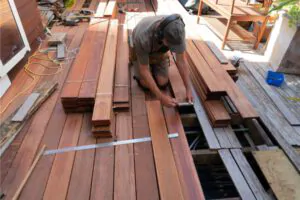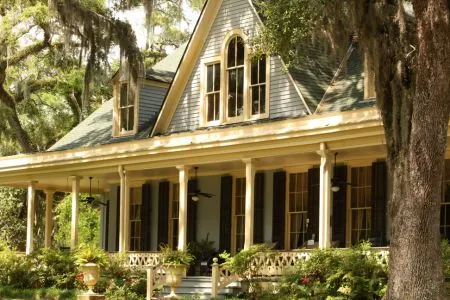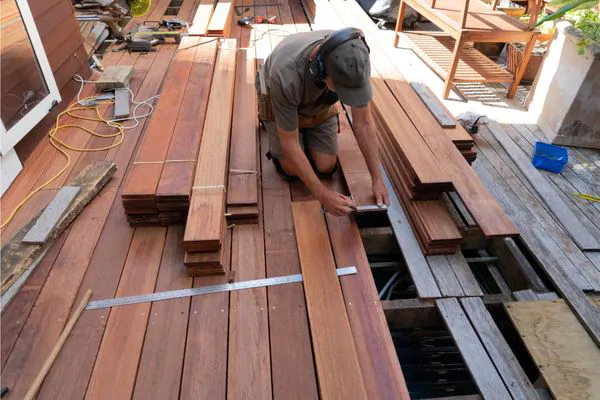Does a deck increase home value? This question plagues many homeowners looking to boost their property’s worth. You might be weighing the costs and benefits of adding a deck, wondering if it’s a smart investment.
It’s a common dilemma faced by those seeking to enhance their living space while also considering future resale value.
A new deck can indeed add value to your home. The National Association of REALTORS reports that deck additions score a high 9.8 out of 10 on the personal enjoyment scale. This suggests that decks are not just about monetary returns, but also about improving your quality of life.
Our article will break down the numbers, compare deck types, and help you make an informed decision about this popular home upgrade. Ready to explore the real impact of decks on home value?
Key Takeaways
- Decks typically increase home value by 5-10%, with homeowners recouping 60-80% of their investment when selling.
- Wood decks offer the highest return on investment at 75.6%, while composite decks provide a 69.1% ROI.
- Homes with decks often sell faster and for 2-5% more than those without, attracting higher buyer interest.
- Deck size, design, materials, and local climate all impact a deck’s value-adding potential, with 300-400 square feet being ideal for most Colorado homes.
- Decks outperform patios in terms of ROI, with decks offering an 83% return compared to patios at 43%, though patios are less expensive to install.
How Much Value Does a Deck Add to a Home?
Adding a deck to your home can boost its value significantly. Research shows that homeowners often recoup 60-80% of their deck investment when selling their property.
Percentage increase in home value
Deck additions increase property value significantly. A well-built deck can raise a home’s worth by 5-10%. This percentage varies based on factors like size, materials, and location. Here’s a breakdown of the numbers:
| Deck Type | Average Cost | Value Added | ROI |
| Wood Deck | $14,000 | $10,600 | 75.6% |
| Composite Deck | $19,000 | $13,100 | 69.1% |
| Patio | $56,000 | $31,000 | 55.2% |
These figures show decks outperform many home improvements. Wood decks offer the highest return, recouping nearly 76% of costs. Composite decks, while pricier, still provide a solid 69% ROI. Even patios, with a lower ROI, add substantial value.
Colorado’s outdoor-loving culture makes decks especially appealing. Homebuyers often consider decks as essential features. This demand drives up property values for homes with quality deck installations.
My experience as a deck builder in Colorado supports these trends. Clients frequently report increased property assessments after adding a deck. One recent project in Boulder saw a 7% increase in appraised value following a custom cedar deck installation.
These percentages are averages. Your specific increase depends on various factors. Quality construction, proper maintenance, and smart design choices maximize your deck’s value-adding potential.
Comparison with non-deck homes
Homes with decks often sell faster and for more money than those without. Let’s look at how deck homes stack up against their non-deck counterparts.
| Aspect | Homes with Decks | Homes without Decks |
| Average Sale Price | Higher by 2-5% | Base price |
| Time on Market | Typically shorter | Longer on average |
| Buyer Interest | Higher, especially post-pandemic | Lower |
| Outdoor Living Space | Ready for use | Requires additional investment |
| Return on Investment | Up to 68% for wood decks | N/A |
The numbers speak for themselves. A wood deck, costing $16,766 on average, recoups about 68% of its value. This boost in home value makes decks a smart choice for Colorado homeowners looking to increase their property’s appeal and worth.
Factors Influencing Deck Value
Several key elements determine how much value a deck adds to your home. The material choice, design complexity, and local climate play crucial roles in shaping a deck’s worth.
Materials used
Deck materials play a crucial role in determining both the longevity and value of your outdoor space. Wood remains a popular choice, offering a classic look and the highest return on investment at 50.2%.
Yet, composite materials like TimberTech’s advanced PVC decking provide superior durability and lower maintenance, yielding higher dollar returns despite a slightly lower ROI of 39.8%.
The right deck material can transform your backyard into a valuable outdoor oasis.
Climate considerations in Colorado influence material selection significantly. Extreme temperature fluctuations and heavy snowfall demand resilient options. Composite decking stands up well to these challenges, resisting warping, fading, and moisture damage better than traditional wood.
This durability translates to long-term value, making composite a smart choice for Colorado homeowners looking to maximize their deck’s lifespan and resale appeal.
Size and design
Size and design play crucial roles in determining a deck’s value and appeal. Larger decks don’t always mean better returns. A deck should complement your home’s style and size. For Colorado homes, experts recommend a deck size between 300 and 400 square feet.
This range offers ample space for outdoor living without overwhelming the property.
Design elements can significantly boost a deck’s appeal. Purpose-driven layouts for dining, entertainment, or relaxation enhance property value. Features like built-in seating, fire pits, or outdoor kitchens can transform a basic deck into a showstopper.
In Colorado’s climate, adding a pergola or partial roof extends usability, protecting from harsh sun and light snow.
Deck materials also impact design and value. While wood remains popular, composite decking is gaining traction for its durability and low maintenance. Many Colorado homeowners opt for composite to withstand the state’s varied weather conditions.
Regardless of material, proper installation following local building codes is essential for safety and longevity. A well-designed, properly sized deck can increase your home’s value by up to 10%, making it a worthwhile investment for many Colorado properties.
Location and Climate
Location plays a crucial role in determining a deck’s value. In Colorado, where outdoor living is prized, a well-designed deck can significantly boost property appeal. The state’s diverse climate, from sunny days to snowy winters, demands careful consideration of deck materials and construction.
Colorado’s varied terrain influences deck design and functionality. Mountain homes benefit from elevated decks that maximize views, while urban dwellings might opt for intimate, ground-level spaces.
The state’s abundant sunshine allows for extended deck use, but UV protection becomes essential for longevity. Proper drainage and snow load capacity are vital in areas with heavy winter precipitation.
Regional preferences also impact deck value. The West, including Colorado, shows higher returns on investment for decks due to year-round enjoyment possibilities. Unlike the Midwest’s 37.4% ROI, Western homeowners often see greater returns.
This difference stems from Colorado’s outdoor-centric lifestyle and milder winters compared to harsher Midwestern climates.
Deck Design and Installation
Deck design and installation are crucial steps in adding value to your Colorado home. Let’s explore the key aspects of creating your dream outdoor space.
- Planning and permits: Start by sketching your ideal deck layout. Obtain proper building permits from your local Colorado authority to ensure compliance with codes.
- Material selection: Choose between wood and composite decking. Wood costs about $17,051 on average, while composite runs around $22,426 but offers a 25-year limited warranty from brands like Trex.
- Size and shape: Design your deck to complement your home’s architecture. Consider multi-level designs for sloped yards or to create distinct outdoor living areas.
- Structural considerations: Factor in Colorado’s climate when planning support beams, joists, and footings. Ensure your deck can withstand heavy snow loads and temperature fluctuations.
- Railing options: Select railings that meet safety standards while enhancing your deck’s aesthetics. Glass panels offer unobstructed views, while metal balusters provide a modern look.
- Lighting and electrical: Incorporate built-in lighting for ambiance and safety. Plan for outdoor outlets to power grills, speakers, or heating elements.
- Stairs and access: Design stairs that smoothly transition from your home to the yard. Wide treads and gentle rises improve comfort and safety.
- Built-in features: Add value with built-in seating, planters, or a pergola for shade. These elements create a custom look and maximize functionality.
- Professional installation: Hire a licensed Colorado deck builder to ensure proper construction. Expert installation can boost your deck’s ROI, potentially recouping 50-63% of costs at sale.
- Maintenance plan: Establish a care routine to protect your investment. Regular cleaning and sealing can extend your deck’s lifespan and maintain its value-adding appeal.
Deck vs. Patio: Which Adds More Value?
Decks often add more value than patios, with a higher return on investment and greater buyer appeal. Read on to discover why decks edge out patios in boosting home value.
Cost Comparison
Deck and patio costs differ significantly. Let’s break down the numbers:
| Feature | Deck | Patio |
| Cost per square foot | $25 – $43 | $5 – $15 |
| Average project cost | $9,000 | $3,500 |
| Added resale value | $7,500 | $1,500 |
| Return on investment | 83% | 43% |
Decks cost more upfront but add greater value to your home. Patios offer a budget-friendly option with decent returns. Concrete patios stand out as a cost-effective choice for boosting resale potential. Your decision depends on budget, space, and personal preferences.
Buyer preference trends
Homebuyers in Colorado increasingly value outdoor living spaces, with decks topping the list of desirable features. This trend gained momentum during the COVID-19 pandemic and continues to influence real estate preferences.
A National Association of Realtors study revealed that decks scored a near-perfect 9.8 out of 10 in their “joy” score for home renovations. This high rating reflects the satisfaction and enjoyment homeowners derive from their deck investments.
Market data shows that properties with well-designed decks often sell faster and at higher prices than comparable homes without this feature. The appeal lies in the versatility decks offer for entertaining, relaxation, and connecting with nature.
Colorado’s climate, with its sunny days and cool evenings, makes decks particularly attractive for year-round use. Buyers see decks as ready-made spaces for outdoor dining, stargazing, or simply unwinding after a long day.
Recent surveys indicate that 81% of homeowners felt a stronger desire to be at home after adding a deck. This statistic highlights the impact of decks on overall home satisfaction.
For those planning to sell, a deck can be a wise investment. It not only increases property value but also creates a compelling selling point that appeals to today’s buyers who prioritize outdoor living spaces.
Our Deck Services
At Colorado Decks, we offer a range of services to enhance your outdoor living space. Our expert team designs and builds custom decks using high-quality materials like composite lumber and treated wood.
We handle everything from initial planning to final installation, ensuring your deck meets local building codes and withstands Colorado’s climate. Our online tools, including a material calculator and deck designer, help you visualize your project and estimate costs.
We also provide deck repair, maintenance, and upgrades to keep your outdoor area looking its best. Whether you’re adding value to your home or creating a space for entertaining, our deck services cater to your specific needs and budget.
Conclusion
Decks offer a strong return on investment for homeowners. They boost property value while providing enjoyable outdoor living space. Wood decks typically yield higher percentage returns, but composite materials often add more dollar value.
Patios can be a cost-effective alternative, sometimes offering full ROI. Ultimately, adding a deck or patio enhances both your home’s appeal and its market worth.
FAQs
1. Does adding a deck increase home value?
Yes, adding a deck can increase your home’s value. A new wood deck often provides a good return on investment (ROI). Real estate agents report that outdoor spaces like decks are attractive to home buyers.
2. How much value does a deck add to a house?
The value a deck adds varies. On average, a wood deck can recoup 65-80% of its cost. A Trex deck might offer even higher returns. The exact value depends on factors like location, size, and market conditions.
3. Is it better to build a deck or patio for resale value?
Both decks and patios can boost resale value. Decks typically offer higher returns. They add usable square footage and create an appealing outdoor living space. The choice depends on your home’s style and local preferences.
4. What types of decks add the most value?
Well-built wooden decks often add the most value. Composite decks, like Trex, are gaining popularity due to low maintenance. The best deck type depends on your climate, home style, and budget.
5. How does deck location affect home value?
Deck location matters. A deck attached to the house or 30 inches above ground usually adds more value. It should complement your home’s layout and offer privacy. Consider views and sun exposure when planning.
6. Do outdoor home improvement projects like decks always increase value?
Most outdoor projects increase home value, but results vary. Decks usually offer good returns. They meet the growing desire for outdoor living spaces. However, overbuilding for your neighborhood may not yield full value. Consider your local market before starting a deck project.









